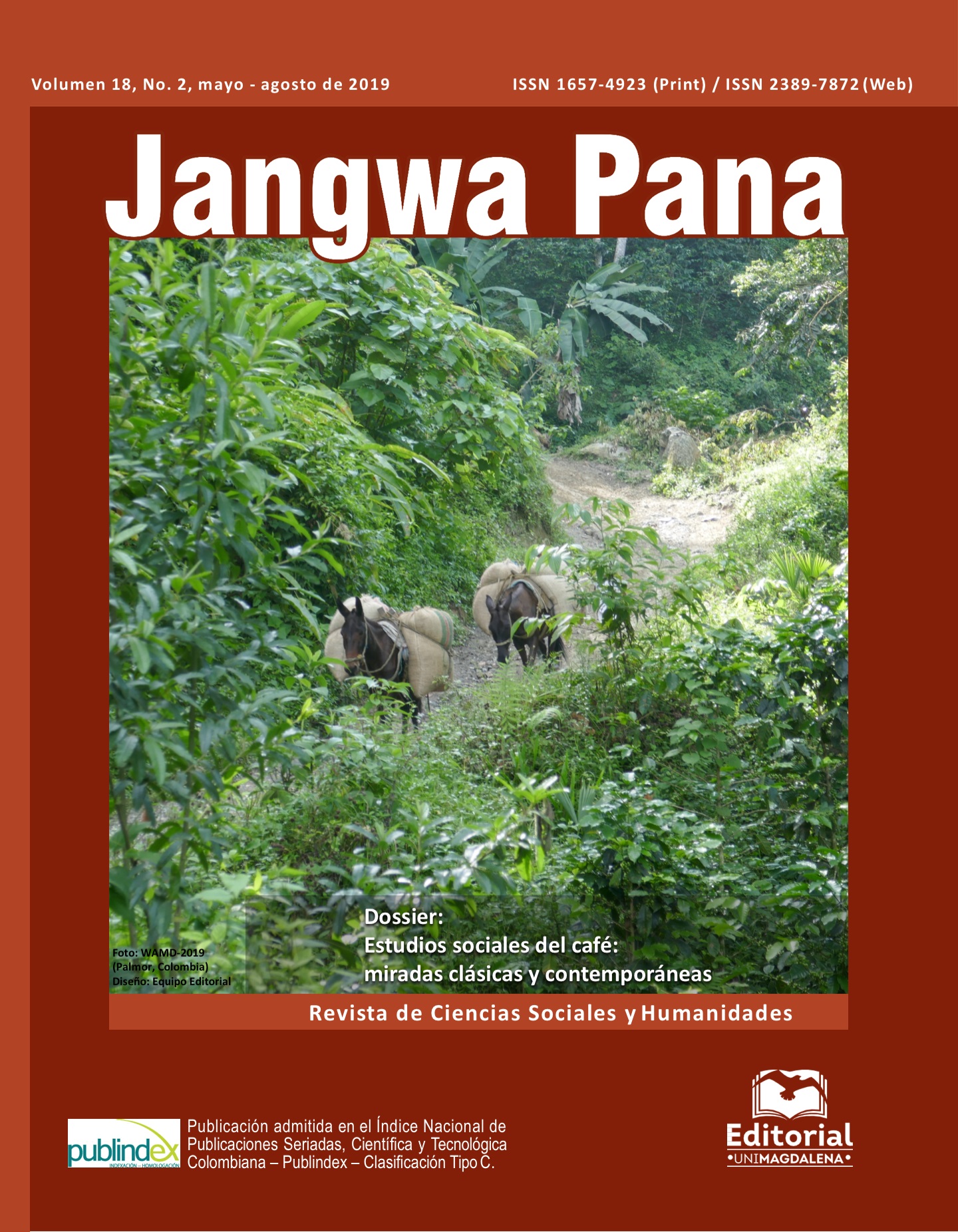Infrastructures of Trust and Sustainability An exploration to the relationship between sustainability and standardisation in the International Coffee production policy
Main Article Content
Abstract
This paper discusses some contributions from Social Studies of Science and Technology (STS) in understanding the socio-technical configurations that sustainability standards bring on coffee production. STS addresses the importance of invisible social and material infrastructures institutional and practical orders. This explores the analytical and empirical landscape of sustainability standards on coffee production.
Downloads
Article Details
References
Bain, C., Ransom, E., y Higgins, V. (2013). Private Agri-Food Standards: Contestation, Hybridity and the Politics of Standards. International Journal of Sociology of Agriculture and Food, 20(1), 1-10.
Bain, C. (2010) Structuring the Flexible and Feminized Labor Market: GlobalGAP Standards for Agricultural Labor in Chile. Signs, 35(2), 343-370. https://www.jstor.org/stable/10.1086/605479.
Bain, C. y Dandachi, T. (2014). Governing GMOs: The (Counter)Movement for Mandatory and Voluntary Non-GMO Labels. Sustainability, 6(12), 9456-9476.
Bain, C. y M. Hatanaka. (2010). The Practice of Third-Party Certification: Enhancing Environmental Sustainability and Social Justice in the Global South? In V. Higgins and W. Larner (eds). Calculating the Social: Standards and the Re-configuration of Governing [pp. 56-74]. Basingstoke: Palgrave MacMillan.
Bain, C. y Selfa. T. (2017). Non-GMO vs Organic Labels: Purity or Process Standards in a GMO Contaminated Landscape. Agriculture and Human Values.
Barham, B. y Weber, J. (2012). The Economic Sustainability of Certified Coffee: Recent Evidence from Mexico and Peru. World Development, 40(6), 1269-1279
Bowker, G. y Star, S.L. (1999) Sorting things out. Classification and its consequences. London: MIT Press.
Brooks, D. (1992) The challenge of sustainability: Is integrating environment and economy enough? Policy Sciences, 25, 401-408.
Busch, L. (2010) Can Fairy Tales Come True? The Surprising Story of Neoliberalism and World Agriculture, Sociologia Ruralis, 50(4)
Busch, L. (2011) Standards: Recipes for Reality. London: MIT Press.
Hatanaka, M. 2010. Trust, Certification, and Partnership in an Organic Shrimp Network: Rethinking Transnational Alternative Agrifood Networks. World Development 38(5),706-716.
Hichliffe, S. (2007) Geographies of Nature. Societies environments ecologies. London: Sage.
ICO, International Coffee Organization (2013) History http://www.ico.org/icohistory_e.asp?section=About_Us
Lampland, M y Leigh Star, S. (2009) Standards and Their Stories: How Quantifying, Classifying, and Formalizing Practices Shape Everyday Life. Ithaca: Ithaca University Press.
Law, J. y Urry, J. (2004) Enacting the social, Economy and Society, 33(3), 390-410, DOI: 10.1080/0308514042000225716
Loconto, A. y Fouilleux, E. (2014). Politics of private regulation: ISEAL and the shaping of transnational sustainability governance. Regulation & Governance, 8(2), 166-185.
Loconto, M y Busch, L (2010). Standards, techno-economic networks and playing fields: Performing the global economy. Review of International Political Economy. 3, 507, 536
MacNeill, J., Winsemius, P. y Yakushiji, T. 1991. Beyond Interdependence. The Meshing of the World's Economy and the Earth's Ecology. Oxford: Oxford University Press.
Maertens, M. (2016). Private Sustainability Standards in the Ugandan Coffee Sector: Empty Promises or Catalysts for Development? 235004.
Pinto, Gardner, Mcdermott y Ayub. (2014). Group certification supports an increase in the diversity of sustainable agriculture network–rainforest alliance certified coffee producers in Brazil. Ecological Economics, 107, 59-64.
Redclift, M. (2005) Sustainable Development (1987–2005): An Oxymoron Comes of Age, Sustainable Development 13(4), 212–227.
Renard, M. (2014) In the name of Conservation: CAFE Practices and Fair Trade in México. Journal of Business Ethics, 92, 287-299.
Rueda X y Lambin E. (2014) Global agriculture and land use changes in the 21st century: Achieving a balance between food security, urban diets and nature conservation. The Evolving Sphere of Food Security (ISBN 978-0-19-935406-1)
Thévenot, L. (2009). Governing Life by Standards: A View from Engagements. Social Studies of Science 39(5): 793-813.
Timmermans, S. y Epstein, S. (2010). A world of standards but not a standard world: Toward a sociology of standards and standardization. Annual Review of Sociology, 36, 69-89.
UN, United Nations. (1987) Report of the World Commission on Environment and Development Our Common Future. http://conspect.nl/pdf/Our_Common_Future-Brundtland_Report_1987.pdf
UN, United Nations. (1992) United Nations Conference on Environment & Development Río de Janeiro, Brazil, 3 to 14 June 1992. AGENDA 21. http://sustainabledevelopment.un.org/content/documents/Agenda21.pdf
UN, United Nations. (2002) Report of the World Summit on Sustainable Development. Johannesburg, South Africa, 26 August- 4 September 2002 http://www.un.org/jsummit/html/documents/summit_docs/131302_wssd_report_reissued.pdf
Urry, J. y Macnaghten, P. (1998) Contested Natures. London: Sage.
Van Der Kamp, M. (2012) Coexisting Organic Standards: Setting Boundaries, Navigating Multiplicity and Enacting Commonality. En M. Barbier and B. Elzen (Eds.), System Innovations, Knowledge Regimes, and Design Practices towards Transitions for Sustainable Agriculture. Inra [online].
Woolgar, S., Coopman, C. y Neyland, D. (2009). Does STS Mean Business? Organization. 16(1), 5–30

